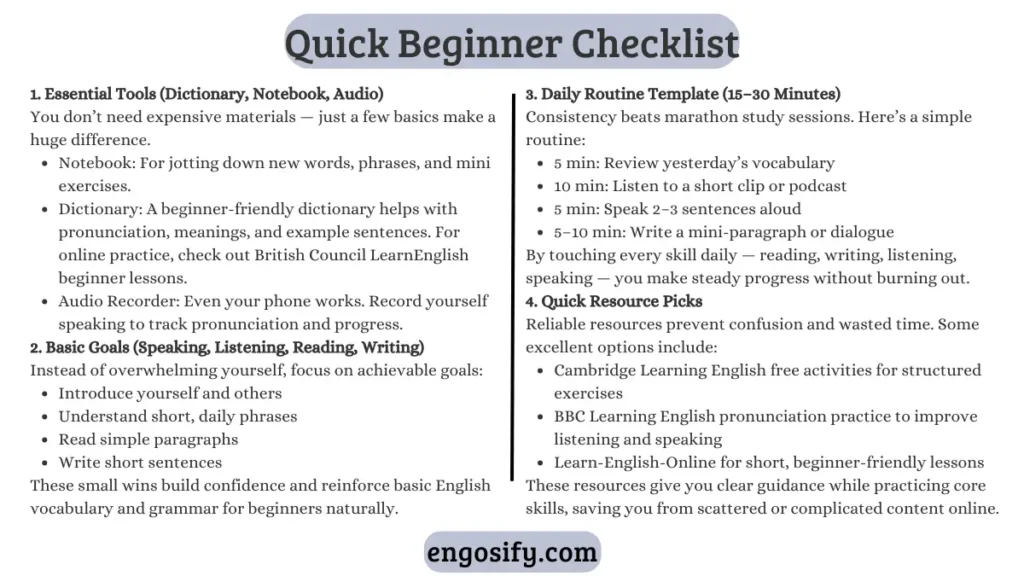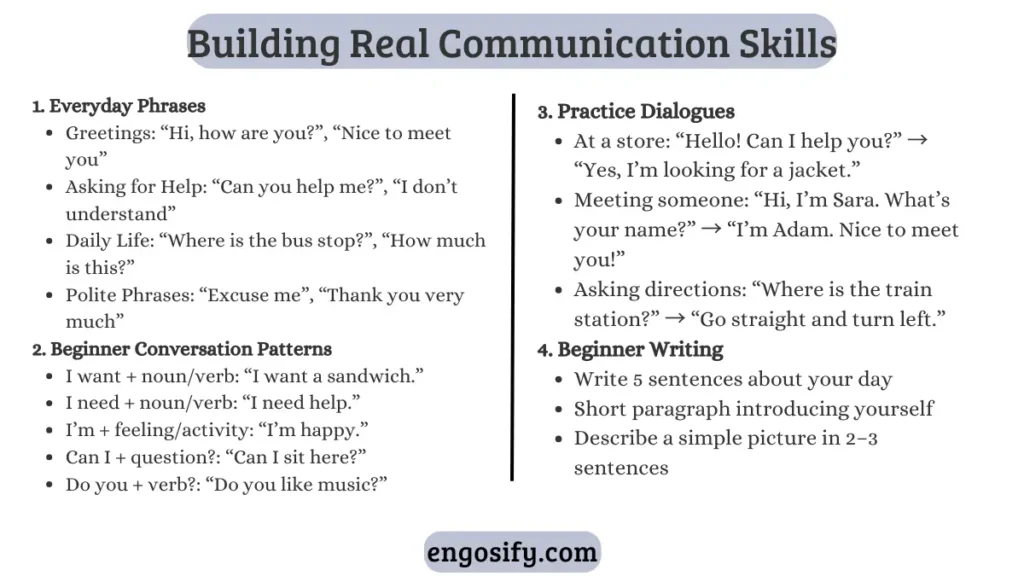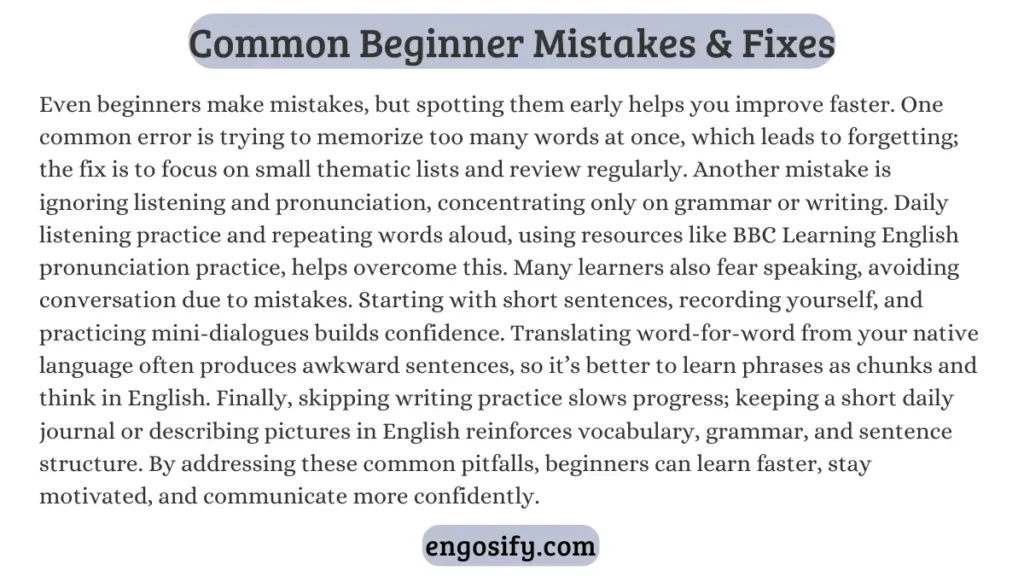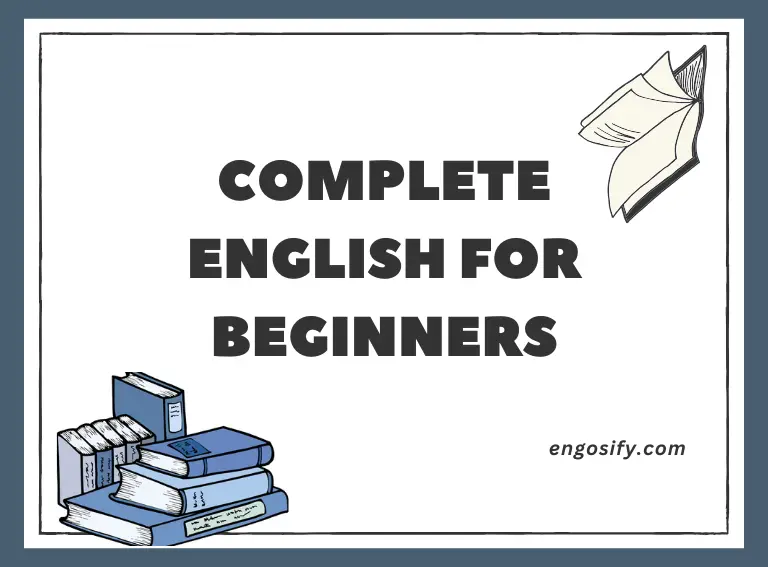Complete English for E— A Practical Guide
When you’re just starting out, English can seem like a maze. But don’t sweat it — this guide simplifies everything. It gives you the key building blocks you need so you can begin speaking, reading, listening, and writing with confidence. And because it’s designed for complete beginners, you’ll find every explanation simple, friendly, and easy to follow.
Our journey brings together essential vocabulary, beginner grammar rules, pronunciation support, listening practice, speaking exercises, and a clear study plan. While you learn, you’ll also discover free, trustworthy resources such as the helpful Cambridge Learning English activities that support learners worldwide (external link placed as requested).
Why This Guide Works (Clear Roadmap)
This guide uses a structured, beginner-friendly approach inspired by the most reliable learning sources available today. Since platforms like Cambridge Learning English offer clear grammar help and pronunciation practice, this guide follows the same logic — step-by-step, simple, and practical.
You’ll get a balanced mix of vocabulary, grammar, listening, speaking, reading, and writing. What’s more, each section includes examples, easy exercises, and LSI elements like beginner English lessons, basic English vocabulary, and simple English stories to help your brain absorb new information naturally.
The goal?
To help you build a foundation strong enough to grow without stress. In other words, this guide hands you a roadmap, not just random tips.
How to Use This Article
Think of this guide as your personal starter toolkit. Rather than racing through everything in one day, take it step-by-step and revisit sections when needed.
Here’s the best way to use it:
- Read each section slowly and take short notes.
- Practice the examples out loud (even if it feels awkward — that’s how fluency starts!).
- Try the mini activities and apply what you learn during your day.
- Use helpful external resources when a topic feels hard or confusing. For instance, the BBC Learning English pronunciation practice page is fantastic for strengthening your listening and speaking skills.
As you move forward, you’ll notice your skills grow piece by piece — like building small blocks that eventually create the whole picture.
Quick Beginner Checklist
Your Beginner Checklist: 5 Things to Start Today
Before diving deep into complete English for beginners, it helps to set up a simple system. Think of this checklist as your starter kit — the tools and habits that make learning smoother, faster, and way less stressful.
1. Essential Tools (Dictionary, Notebook, Audio)
You don’t need fancy equipment, but having a few basics makes a world of difference.
Grab a small notebook, an online dictionary, and something to record your voice — even your phone works perfectly.
A good dictionary helps you check pronunciation, find example sentences, and understand word forms. If you prefer simple English explanations, the British Council LearnEnglish beginner lessons are incredibly helpful and clear for new learners.
Your voice recorder helps with pronunciation practice, shadowing, and speaking repetition. It’s uncomfortable at first, but wow — the improvement is real.
2. Basic Goals (Speaking, Listening, Reading, Writing)
Beginners often worry about “perfect English,” but honestly, you only need a few small goals:
- say a simple introduction,
- understand short daily-life phrases,
- read very short paragraphs,
- and write basic sentences.
These tiny goals keep you motivated while also building the four major language skills step by step. And because you’re learning basic English vocabulary and beginner grammar rules, progress appears faster than you expect.
3. Daily Routine Template (15–30 Minutes)
Consistency beats everything. You don’t need two-hour sessions; instead, try this simple routine:
- 5 minutes: review yesterday’s vocabulary
- 10 minutes: listen to a short audio clip
- 5 minutes: speak 2–3 sentences out loud
- 5–10 minutes: write one small paragraph or mini-dialogue
This routine works because it touches all areas at once — and your brain loves repetition in small doses.

4. Quick Resource Picks
When you feel stuck or want extra practice, don’t wander around the internet — use reliable learning spaces. For example, Cambridge Learning English free activities offer clear, guided tasks perfect for refreshing grammar and practicing reading or listening.
These short, trustworthy exercises help you stay on track without feeling lost in complicated materials.
Core Building Blocks
Start With the Foundations
Every strong language journey begins with the basics. And when you’re building complete English for beginners, the foundations matter more than anything else. These blocks — vocabulary, grammar, pronunciation, and listening/speaking — create the structure you’ll build on every single day.
Essential Beginner Vocabulary (Daily Life Topics)
Vocabulary is the heart of communication. Without words, you can’t form sentences, express ideas, or understand others. So your first mission is simple: learn the words you use every day.
Start with daily life topics such as:
- Greetings: hello, good morning, how are you
- Numbers: one, two, three…
- Family: mother, father, sister
- Food: bread, fruit, vegetables
- Time: morning, night, today, tomorrow
- Directions: left, right, straight
Try putting new words into short sentences:
- “This is my sister.”
- “I want three apples.”
- “Turn left, please.”
Using simple English sentences helps your brain connect vocabulary and meaning. As you continue learning basic English vocabulary, you’ll notice you can understand small conversations faster and start speaking with more confidence.
And remember: don’t learn random words — learn useful words from your life.
Basic Grammar You Need First
Grammar can look scary, but for beginners, you only need a few rules to start speaking clearly. Think of grammar as the engine that helps your words move smoothly.
Here are the first rules to focus on:
- Subject + Verb + Object
(“I like coffee.” “She reads books.”) - Simple Present
For daily routines: I work, you study, they play. - Present Continuous
For right now: I am learning English. - Simple Past (basic irregular verbs)
Went, saw, did, had, made. - Articles
a, an, the — small words, big importance. - Pronouns
I, you, he, she, we, they.
While learning these, use short examples, repeat them aloud, and write your own tiny sentences. Little by little, the rules stop feeling like rules and start feeling natural.
Pronunciation & Phonetics Basics
Good pronunciation helps you sound clearer, understand others better, and build confidence. Even if you’re shy, practicing pronunciation early makes speaking easier later.
Focus on:
- Word stress: TAble, docTOR, beGIN
- Common vowel sounds: /i/, /ɪ/, /æ/, /u/
- Difficult consonants: th, r, l
- Connected speech: words joining together in real conversation
To improve fast, try shadowing — listen to a native speaker, pause, then repeat exactly how they say it. Even just three minutes a day works wonders.
For extra help, “BBC Learning English pronunciation practice” offers simple explanations and slow audio designed for new learners.
Listening & Speaking Starter Exercises
Listening and speaking are the living, breathing sides of English. You can’t master them by reading alone — you have to use them.
Try these beginner-friendly exercises:
- Mini dictation: listen to a short clip and write 2–3 words you hear.
- Shadowing: repeat after a speaker, copying rhythm and tone.
- Role-play: pretend you’re ordering food, asking for help, or introducing yourself.
- Slow audio practice: choose simple English stories or short clips designed for beginners.
Listening fuels your speaking. Speaking reinforces your grammar. Both build your confidence piece by piece.
Building Real Communication Skills
Everyday Phrases You Must Know
Once you know the basics of complete English for beginners, the next step is learning phrases you can use instantly. These short expressions help you survive real conversations without freezing or feeling lost. And because they’re used everywhere, you’ll hear them again and again.
Here are essential beginner-friendly phrases:
- Greetings & Introductions
Hi, how are you?
Nice to meet you.
My name is… - Asking for Help
Can you help me, please?
I don’t understand.
Can you repeat that? - Daily Life Phrases
Where is the bus stop?
How much is this?
I’d like this one, please. - Polite Phrases
Excuse me.
Thank you very much.
No problem.
Because conversations often depend on tone and context, practicing these expressions with simple role-play helps your brain recognize them faster. Try using each phrase in 2–3 mini sentences and repeat them throughout your day.
Beginner Conversation Patterns
Patterns help you speak without thinking too much. When you use ready-made structures, your brain relaxes and communication feels easier. Here are a few that beginners love:
- I want + (noun/verb)
I want a sandwich.
I want to learn English. - I need + (noun/verb)
I need help.
I need to go now. - I’m + (feeling/activity)
I’m happy.
I’m studying English. - Can I + (question)?
Can I sit here?
Can I have water, please? - Do you + (verb)?
Do you understand?
Do you like music?
These patterns give you flexibility while keeping things extremely simple — perfect for beginners. And because they appear everywhere in daily communication, they naturally build fluency and rhythm.

Practice Dialogues for Real Situations
Dialogues help you connect grammar, vocabulary, and pronunciation all at once. They also reduce the fear of speaking because you already know what to say in common situations.
Try these short dialogues:
1. At a Store
A: Hello! Can I help you?
B: Yes, I’m looking for a jacket.
A: What size do you need?
B: Medium, please.
2. Meeting Someone New
A: Hi, I’m Sara. What’s your name?
B: I’m Adam. Nice to meet you!
A: Nice to meet you too.
3. Asking for Directions
A: Excuse me, where is the train station?
B: Go straight and turn left.
A: Thank you!
B: You’re welcome.
Practice each dialogue out loud several times. Try switching roles. Then replace a few words with your own ideas. This builds confidence and helps your speaking become smoother and more natural.
Beginner Writing Skills (Simple Sentences & Short Paragraphs)
Writing forces your brain to organize thoughts clearly. And while beginners don’t need to write long essays, practicing short sentences helps you remember vocabulary and grammar faster.
Start with these simple exercises:
1. Write 5 Daily Routine Sentences
- I wake up at 7.
- I go to work.
- I study English at night.
2. Write a Short Paragraph About Yourself
Just 4–5 sentences is enough:
“My name is Aisha – I am from Morocco – I like cooking and learning English – I study every evening for 20 minutes.”
3. Describe a Picture
Choose a simple photo and write 3 sentences about what you see.
This improves vocabulary, grammar, and observation skills at the same time.
As you continue practicing, writing becomes less scary and more natural. It also supports speaking because both skills use similar structures and vocabulary.
Best Resources & Tools
To build strong conversational English skills, learners need the right mix of practical tools and engaging resources. Here are the best options to support consistent improvement:
1. Language Exchange Apps
Apps like HelloTalk, Tandem, or Speaky connect learners with real people for live conversations. These platforms are ideal for practicing natural speech, slang, and everyday expressions.
2. English-Learning Platforms
Websites such as BBC Learning English, ESL Fast, and EngVid offer short lessons, listening practice, and conversation-focused topics that help learners absorb natural English patterns.
3. AI & Chat-Based Tools
AI tools—including ChatGPT—allow learners to simulate conversations, ask questions, and practice real-life scenarios anytime. They’re great for building confidence before talking to native speakers.
4. Podcasts for Real-Life English
Shows like ESL Pod, All Ears English, and 6 Minute English expose learners to everyday vocabulary and cultural nuances while improving listening comprehension.
5. YouTube Channels
Creators such as Rachel’s English, English with Lucy, and Speak English With Mr. Duncan provide conversational tips, pronunciation training, and practical speaking examples.
6. Social Media & Short-Form Content
TikTok, Instagram Reels, and YouTube Shorts introduce learners to quick, bite-sized English phrases and real conversational language used in daily life.
7. Online Conversation Classes
Platforms like iTalki, Preply, or Cambly offer one-on-one speaking practice with native or fluent speakers—perfect for personalized feedback.
Common Beginner Mistakes & Fixes
Even motivated learners make mistakes — it’s completely normal! Recognizing common pitfalls early can save frustration and speed up progress. Here’s what beginners often struggle with and how to fix it:
Mistake 1: Trying to Memorize Too Many Words at Once
It’s tempting to cram dozens of vocabulary words daily, but your brain can only retain so much at once. Overloading leads to forgetting and frustration.
Fix: Focus on thematic word lists like food, travel, or daily routines. Use spaced repetition apps and review words multiple times in small chunks. Quality over quantity ensures better retention.
Mistake 2: Ignoring Listening & Pronunciation
Some learners concentrate solely on grammar and writing while neglecting listening and speaking. This leads to slow comprehension and difficulty communicating in real situations.
Fix: Practice daily listening exercises, shadow native speakers, and repeat words aloud. Resources like BBC Learning English pronunciation practice provide clear, beginner-friendly audio examples that make listening fun and effective.
Mistake 3: Fear of Speaking
Many beginners hesitate to speak because they’re afraid of making mistakes. This slows progress and lowers confidence.
Fix: Start with micro-speaking tasks — record yourself saying 1–2 sentences, practice short dialogues, or chat with language partners online. Remember, making errors is a natural part of learning. The key is consistent practice in a low-pressure environment.
Mistake 4: Over-Reliance on Translating
Translating word-for-word from your native language can lead to awkward sentences and slow thinking.
Fix: Try thinking in simple English phrases. Learn expressions as whole chunks instead of single words. Role-playing and mini-dialogues help reinforce natural usage.

Mistake 5: Skipping Writing Practice
Beginners often focus on speaking and listening, forgetting that writing strengthens memory and grammar.
Fix: Maintain a short daily writing journal or describe simple pictures in English. Even a few sentences a day make a big difference in your confidence and accuracy.
By addressing these common mistakes early and using the suggested fixes, beginners can maintain motivation, improve quickly, and enjoy the process of learning complete English for beginners.
FAQs
1. How long does it take to learn basic English as a beginner?
With consistent practice — about 15–30 minutes daily — most beginners can hold simple conversations within 3–6 months. Using structured courses, like Udemy beginner English courses or Cambridge free activities, accelerates progress and builds confidence faster.
2. What are the most important grammar topics for beginners?
Focus on the essentials:
- Present simple and present continuous
- Simple past
- Articles (a, an, the)
- Pronouns (I, you, he, she, we, they)
- Basic modal verbs like can and must
Mastering these gives you the foundation to form clear sentences quickly.
3. What’s the best way to practice speaking if I don’t have a partner?
Try recording yourself, shadowing audio from short beginner podcasts, or using online platforms like ABA English or EF English Live for one-on-one practice. Speaking aloud, even alone, trains your mouth and brain to work together naturally.
4. Can I learn English well for free?
Absolutely! Free resources like Cambridge Learning English free activities, Learn-English-Online, and ESOLCourses offer structured lessons, listening practice, and grammar exercises. Paid courses are optional if you want faster progress with guided feedback.
5. Which apps help beginners the most?
Look for apps that combine vocabulary, speaking, and listening practice:
- Spaced repetition apps for vocabulary retention
- Pronunciation apps to improve speaking
- Graded readers for simple stories
- Conversation apps like HelloTalk or Tandem for practice with real people
These tools make learning interactive, engaging, and effective, especially for daily practice.
6. How can I stay motivated as a beginner?
Set small, achievable goals, like learning five new words a day, completing one listening exercise, or speaking for 2 minutes aloud. Track progress in a notebook or app, and celebrate small wins — consistency is more important than perfection.
Conclusion: Start Small, Stay Consistent
Learning complete English for beginners doesn’t have to be overwhelming. By focusing on small, daily steps—practicing vocabulary, grammar, listening, speaking, and writing—you’ll see steady progress. Use reliable resources like Cambridge Learning English free activities or BBC Learning English pronunciation practice to guide your practice, and remember: consistency beats intensity. Start with short, achievable goals, track your progress, and don’t fear mistakes—they’re part of the journey. With patience, practice, and persistence, you’ll gradually gain the confidence to communicate naturally and enjoy the process of learning English.

